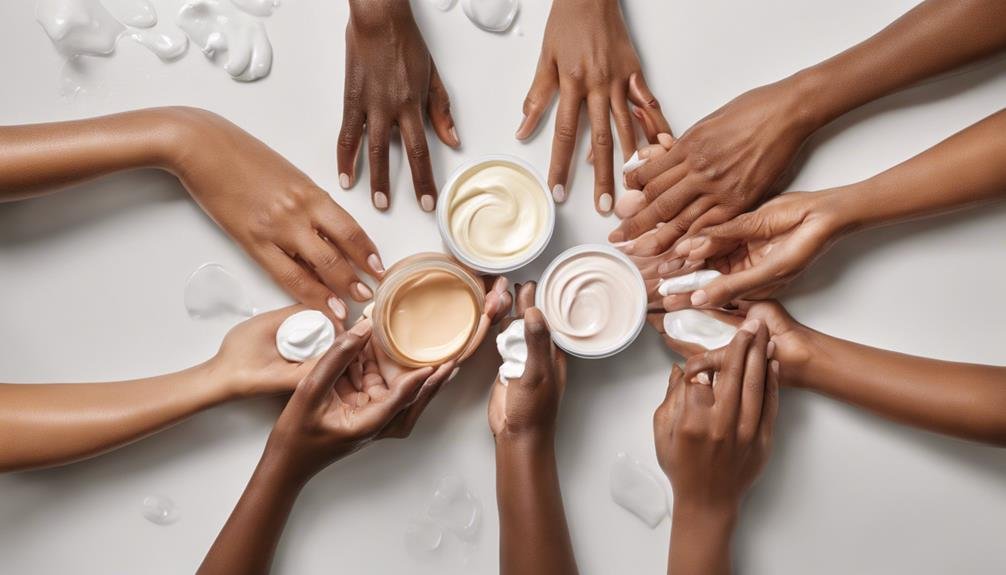To achieve a flawless complexion, starting your day with a gentle cleanser is key. But what if we told you there's more to the story? Your skin is a reflection of your overall health, and simple lifestyle changes can make a world of difference. So, what are the other essential elements that can contribute to clear, healthy skin?
Key Takeaways
- Establish a consistent skincare routine with gentle cleansers and moisturizers.
- Stay hydrated with water-rich foods and antioxidants for glowing skin.
- Use high SPF sunscreen daily to protect against UV damage.
- Regularly exfoliate to remove dead skin and enhance product absorption.
- Avoid harsh chemicals in skincare products and household items.
Cleanse Daily
To maintain clear, healthy skin, cleansing daily is essential. Washing your face each day helps remove dirt, oil, makeup, and other impurities that can clog pores and lead to breakouts. Choose a gentle cleanser that suits your skin type to avoid stripping away natural oils that protect and nourish your skin. Whether you have oily, dry, combination, or sensitive skin, a daily cleansing routine is the foundation of good skincare.
When cleansing, use lukewarm water to avoid irritating or drying out your skin. Gently massage the cleanser onto your face in circular motions, focusing on areas prone to oiliness or blemishes. Rinse thoroughly and pat your skin dry with a clean towel.
Consistency is key; make cleansing a part of your morning and evening routine to maintain healthy skin.
Hydrate Inside and Out
Maintaining clear and healthy skin involves more than just external care. Hydrating your skin from the inside out is crucial for a radiant complexion. Drinking an adequate amount of water each day helps flush out toxins and keeps your skin hydrated. Additionally, using moisturizers and serums can help lock in moisture and maintain a healthy skin barrier.
| Internal Hydration | External Hydration |
|---|---|
| Drink plenty of water throughout the day | Use a hydrating moisturizer daily |
| Eat water-rich foods like fruits and vegetables | Apply a facial serum with hyaluronic acid |
| Avoid excessive caffeine and alcohol consumption | Use a facial mist to refresh and hydrate skin |
| Consider adding a humidifier to your living space | Opt for gentle cleansers to avoid stripping skin |
| Limit hot showers to prevent skin dehydration | Exfoliate regularly to remove dead skin cells |
Protect With SPF
Consistently applying sunscreen with a high SPF is essential for protecting your skin from harmful UV rays. Sunscreen not only prevents sunburn but also helps in reducing the risk of skin cancer and premature aging.
To effectively shield your skin, opt for a broad-spectrum sunscreen with at least SPF 30 and apply it generously 15 minutes before heading out. Don't forget to reapply every two hours, especially if you're sweating or swimming.
Make sunscreen a non-negotiable part of your daily skincare routine, even on cloudy days or during winter months when the sun's rays are still present. Your face, neck, ears, and any other exposed areas should be covered with sunscreen to ensure comprehensive protection.
Look for oil-free or non-comedogenic formulas if you have acne-prone skin. Remember, UV rays can penetrate through windows, so safeguard your skin even when indoors.
Exfoliate Regularly
Regular exfoliation is a crucial step in achieving clear, healthy skin. By removing dead skin cells that can clog pores and dull your complexion, exfoliating regularly reveals fresh, radiant skin underneath.
When you exfoliate, you're not only helping to prevent breakouts and blackheads but also promoting cell turnover, which can improve skin texture and tone. Whether you choose a physical exfoliant with granules or a chemical exfoliant like alpha hydroxy acids, be gentle to avoid irritating your skin.
Aim to exfoliate 2-3 times a week, adjusting based on your skin's needs and sensitivity. Remember to follow up with a hydrating moisturizer to keep your skin balanced and nourished. Regular exfoliation can also enhance the absorption of your skincare products, making them more effective.
Make exfoliation a regular part of your skincare routine to achieve a smoother, brighter complexion.
Moisturize Adequately
To continue your journey towards clear, healthy skin, ensuring adequate moisturization plays a significant role in maintaining a balanced complexion. Moisturizing your skin is essential for keeping it hydrated, soft, and protected from environmental stressors.
When choosing a moisturizer, opt for one that suits your skin type – whether it's oily, dry, combination, or sensitive. For oily skin, look for lightweight, oil-free formulas. Dry skin benefits from richer, creamier textures. Combination skin may require different moisturizers for various areas of the face. Sensitive skin should be treated with gentle, fragrance-free options to prevent irritation.
Applying moisturizer twice a day, after cleansing, helps lock in moisture and create a protective barrier for your skin. Focus on areas prone to dryness, such as elbows, knees, and heels. Don't forget about your lips – use a lip balm with SPF to keep them soft and shielded from the sun.
Eat Skin-Friendly Foods
For clear, healthy skin, incorporating skin-friendly foods into your diet is crucial. What you eat can have a significant impact on the health of your skin. To promote clear and radiant skin, focus on consuming foods rich in antioxidants like berries, tomatoes, and nuts. These antioxidants help combat free radicals that can damage skin cells and accelerate aging.
Additionally, omega-3 fatty acids found in fatty fish like salmon and walnuts can help maintain skin health by reducing inflammation and keeping your skin moisturized.
Vitamins A and E, commonly found in sweet potatoes, spinach, and avocados, are also essential for healthy skin as they support cell regeneration and protect against UV damage.
Furthermore, staying hydrated by drinking plenty of water and herbal teas can help flush out toxins from your body, promoting clearer skin from within. Remember, a balanced diet filled with skin-friendly foods can work wonders for achieving that healthy, glowing complexion you desire.
Avoid Harsh Chemicals
To maintain clear and healthy skin, it's essential to avoid exposing your skin to harsh chemicals that can cause irritation and inflammation. Harsh chemicals are often found in skincare products like certain cleansers, toners, and exfoliators. These chemicals can strip your skin of its natural oils, disrupt its pH balance, and lead to redness, dryness, or even allergic reactions.
When choosing skincare products, look for gentle, natural ingredients that nourish and protect your skin. Avoid products that contain sulfates, parabens, synthetic fragrances, and phthalates. Opt for products labeled as "non-comedogenic," meaning they won't clog your pores.
Furthermore, be cautious with household cleaning products that may come into contact with your skin. Wear gloves when handling harsh chemicals like bleach or ammonia to prevent skin irritation.
Get Enough Sleep
Getting enough sleep is crucial for maintaining clear and healthy skin. When you don't get adequate rest, your skin can become dull, dry, and prone to breakouts. During sleep, your body repairs and regenerates skin cells, helping to maintain a youthful appearance and prevent premature aging. Lack of sleep can lead to increased stress levels, which in turn can trigger inflammation and exacerbate skin conditions like acne and eczema.
Make sure to aim for 7-9 hours of quality sleep each night to give your skin the time it needs to rejuvenate. Establish a relaxing bedtime routine, such as dimming the lights, avoiding screens before bed, and practicing mindfulness or meditation. Creating a sleep-conducive environment with a comfortable mattress, pillows, and bedding can also improve the quality of your rest.
Prioritizing sleep is an essential part of your skincare routine that can have a significant impact on the clarity and health of your skin. So, make sleep a non-negotiable part of your self-care regimen for glowing, radiant skin.
Manage Stress Levels
A key factor in maintaining clear and healthy skin is effectively managing your stress levels. Stress can trigger skin issues like acne, eczema, and psoriasis, making it crucial to find ways to unwind and relax. High stress levels elevate cortisol, a hormone that can increase oil production in the skin, leading to breakouts. Here are some practical tips to help you manage stress and keep your skin glowing:
| Stress Management Tips | Description |
|---|---|
| Practice deep breathing | Deep breathing exercises can help calm your mind and reduce stress levels. |
| Engage in physical activity | Regular exercise releases endorphins, which are natural stress fighters. |
| Try meditation | Meditation can promote relaxation and mindfulness, reducing stress and its impact on your skin. |
Incorporating these stress management techniques into your daily routine can significantly improve your skin health. Remember, taking care of your mental well-being is just as important as your skincare routine for achieving that clear and radiant complexion.
Exercise Regularly
Engaging in regular exercise is a vital component of maintaining clear and healthy skin. When you exercise, you increase blood flow, which helps nourish skin cells and keep them healthy. Sweating during exercise also helps to flush out toxins from your skin, giving you a natural glow. Additionally, physical activity reduces stress, a common trigger for skin issues like acne and eczema.
Cardiovascular exercises like running, cycling, or dancing are particularly beneficial for your skin as they increase your heart rate and promote circulation. Strength training exercises can also be helpful by toning muscles and improving skin elasticity. Aim for at least 30 minutes of moderate exercise most days of the week to reap these skin benefits.
Remember to cleanse your skin both before and after exercising to prevent clogged pores and breakouts. Choosing the right workout gear, like moisture-wicking fabrics, can also help prevent skin irritation.
Stay Hydrated
Hydration plays a crucial role in maintaining clear and healthy skin. Keeping your skin hydrated helps maintain its elasticity, flush out toxins, and promote a radiant complexion. Here are some essential tips to ensure you stay hydrated for glowing skin:
| Hydration Tip | Description |
|---|---|
| Drink water | Aim for at least 8 glasses of water daily to keep your skin supple and hydrated. |
| Eat hydrating foods | Incorporate fruits like watermelon and cucumbers into your diet for added hydration. |
| Use a humidifier | Especially in dry climates, a humidifier can help prevent your skin from drying out. |
| Limit caffeine | Excessive caffeine consumption can dehydrate your skin, so be mindful of your intake. |
| Moisturize regularly | Apply a hydrating moisturizer morning and night to lock in moisture and maintain skin health. |
Consult a Dermatologist
Wondering about the best ways to address specific skin concerns or looking to enhance your skincare routine? Consulting a dermatologist can provide you with personalized advice tailored to your skin type and concerns. Dermatologists are experts in all things skin-related and can offer professional guidance on how to achieve clear and healthy skin.
Whether you're dealing with stubborn acne, persistent dryness, or other skin issues, a dermatologist can assess your skin's condition and recommend the most effective treatments. They can also help you create a customized skincare routine that suits your needs and lifestyle.
In addition to treating existing skin problems, dermatologists can help prevent future issues by recommending suitable products and practices for your skin type. Visiting a dermatologist regularly can lead to significant improvements in your skin's overall health and appearance.
Don't hesitate to schedule a consultation with a dermatologist to take your skincare routine to the next level and achieve the clear, healthy skin you desire.
Frequently Asked Questions
Can Specific Foods Worsen Skin Conditions?
Yes, specific foods can worsen skin conditions. Certain items like dairy, sugary treats, and processed foods may trigger inflammation and acne. Opt for a balanced diet rich in fruits, vegetables, and whole grains for clearer, healthier skin.
Is It Necessary to Change Skincare Products Often?
You don't always need to switch skincare products often. Find what works for you and stick with it. Consistency is key to maintaining healthy skin. Experiment cautiously and consult professionals for guidance when needed.
How Do Hormones Affect Skin Health?
Hormones play a crucial role in skin health, impacting oil production, collagen levels, and more. Changes in hormone levels can lead to acne, dryness, or dullness. Understanding hormonal shifts and their effects can help you better care for your skin.
Are Natural Remedies Effective for Acne?
When dealing with acne, natural remedies can be effective. Tea tree oil, aloe vera, and green tea possess antibacterial properties that can help reduce inflammation and clear up skin. Consistent use may improve your skin's appearance.
Can Climate Impact Skin Hydration?
In certain climates, skin hydration can be impacted. Factors like low humidity levels or extreme temperatures can lead to dryness. To combat this, ensure you stay hydrated, use a good moisturizer, and consider a humidifier for your home.
Conclusion
In conclusion, by following these simple yet effective tips, you can achieve clear, healthy skin and maintain a radiant complexion. Remember to cleanse daily, hydrate inside and out, protect with SPF, exfoliate regularly, moisturize adequately, manage stress levels, exercise regularly, and stay hydrated. And don't forget to consult a dermatologist for personalized advice. Your skin will thank you, and you'll feel like a total glow-getter!







